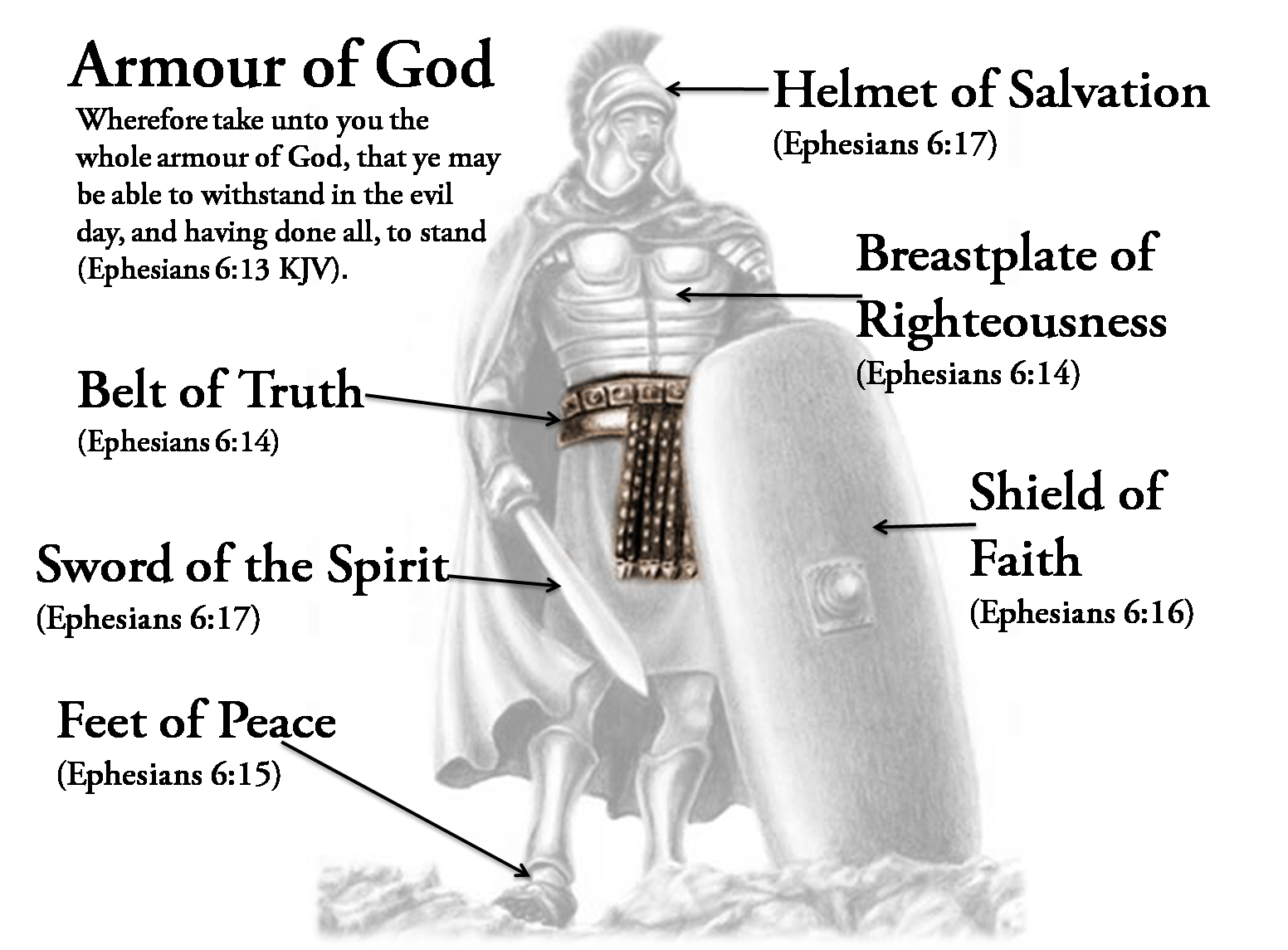Today I want to talk about a topic that we don’t very often discuss in
church, a topic many Christian’s are uncomfortable about talking about, the
Devil and spiritual warfare.
Paul in Ephesians writes “For our struggle is not against flesh and blood, but
against the rulers, against the authorities, against the powers of this dark
world and against the spiritual forces of evil in the heavenly realms.” (Ephesians 6:12)
And the apostle Peter warns us “Be alert and of sober mind. Your enemy the devil prowls around like a roaring lion looking for someone to devour.” (1 Peter 5:8)
Jesus was fully aware that he and his followers are
involved in a spiritual battle. When he
sent out his disciples he gave them this instruction “As you go, proclaim this message: ‘The
kingdom of heaven has come near.’ Heal the sick, raise the dead,
cleanse those who have leprosy, drive out demons.” (Matthew 10:7-8)
DO NOT UNDERESTIMATE THE
ENEMY
Winston
Churchill described the fall of Singapore to the Japanese in 1942 as the "worst disaster and
largest capitulation in British history". The fall of Singapore came
about because the British underestimated their enemy. British troops stationed
in Singapore were told that the Japanese were poor fighters, and would never be
able to take Singapore. But when the
Japanese attacked, it took everyone by surprise, both because of the speed of
the onslaught which didn’t give the British forces time to re-group, and also
because they attacked from the land, through the jungle and mangrove swamps of
the Malay Peninsula, and not from the sea as the military planners had
assumed.
As Christians we must not underestimate our enemy.
In the Screwtape Letters CS Lewis writes “There are two equal and opposite errors into
which our race can fall about the devils.
One is to disbelieve in their existence.
The other is to believe, and to feel an excessive and unhealthy interest
in them. They themselves are equally
pleased by both errors.”
As Christians we need to recognise that there is a battle
taking place over our souls. The devil is the absolute opposite to God,
and he wants to destroy our relationship with God, that is why Jesus likened
the devil to a thief who comes "to steal, kill, and destroy" (John 10:10).
As Christians we should not be surprised if we come
under attack from the devil. Spiritual
battles can manifest in our daily lives through relational conflict, temptation,
persecution, financial pressures, illness, doubt, despair, discourgment. In these and other situations, our enemy wants to undermine our faith and trust in
God.
The devil doesn’t want to see a thriving flourishing
church, and if he can undermine it in any way he will.
So what should our response be to all of this?
BEING PROPERLY EQUIPPED FOR BATTLE
When going into battle, it is important to go in
properly equipped. In the battle of
Rorke’s Drift in 1879,150 British and Colonial troops successfully defended a
garrison against an intense assault by 3 to 4 thousand Zulu warriors. The reason the assault failed, was because
the Zulu warriors were poorly equipped with spears and antiquated rifles and
muskets, which was no match to the weapons or training that the British
soldiers had.
We need to make sure we are properly equipped for
battle against the devil. We need to
equip ourselves with the spiritual armour of God, the belt of truth, the breastplate
of righteousness, shoes of peace, the shield of faith, the helmet of salvation
and the sword of the spirit.
BELT OF TRUTH
The first part of the armour of God is the belt of
truth. When preparing for a battle, a
soldier would put on his belt first, because it was designed to keep the other
pieces of the soldier’s armour in place.
Satan is the great deceiver, who often attacks truth
with lies.
·
Adam & Eve
o
God “You are free to eat from any tree in the garden; but you
must not eat from the tree of the knowledge of good and evil, for
when you eat from it you will certainly die.”
o “Did
God really say, ‘You must not eat from any tree in the garden’?”… “You will not certainly
die.”
The Devil wants us to attack truth with lies, to make
us doubt who we are in Christ. And he
often does this by planting thoughts or ideas into our mind, as if they’re our
own. For example, the thought may come: "My life isn't worth living.", "God doesn't care about me," “I’m no good.” “I’m a
failure and disappointment to God.” The devil knows we are far more likely
to believe his lies if we acknowledge the thoughts as our own.
We need to put on the belt of truth. We need to be
firmly established in the truth of God’s word, so that we can resist Satan’s
lies and deceit. Jesus said, “If you hold to my teaching, you are really my disciples. Then you will know the truth,
and the truth will set you free.” (John 8:31-32)
This is why knowing God’s
word is so important, so that we can resist the attacks of the enemy, by
knowing and abiding in the truth.
BREASTPLATE OF RIGHTEOUSNESS
Next is the breastplate of
righteousness. The breast plate
protected the vital organs, like the heart and lungs.
Righteousness is one of
those strange words we use in church, but it simply means to be in a RIGHT RELATIONSHIP with God. We nurture a right relationship with God
through prayer, worship, being open to God’s Holy Spirit, walking in faithful
obedience to God.
SHOES
We are then called to have our feet fitted with the
readiness that comes from the Gospel of peace.
In the imagery that Paul uses, there is the idea that we have to go out
and face the enemy face on. And as
Christians the way we do that, is to always be ready to carry the message of
God’s love to the world.
When we carry the Gospel of Jesus Christ into the
world, the message of love and peace, we are taking the battle to the enemy, we
are building the Kingdom of God, tackling head on the forces of darkness in the
world. Because even the smallest candle
dispels darkness.
SHIELD OF FAITH
Next comes the shield of faith. The purpose of a shield is to deflect
missiles. So when we come under spiritual attack, the shield of faith is there
to protect us.
Carrying the shield of faith is about placing our faith,
trust and confidence in God, and knowing who God is, and what He is like, because
our enemy will try to attack and distort our perception of God, in the hope of
diminishing our trust in God.
The devil tries to create a credibility gap between
what the Word of God says and our actual experience. Satan may point his
accusing finger at God while planting doubts in your mind such as, "What if God has forgotten about
you?" Or, "If God really loved you, He wouldn't
have allowed this." If the doubts go unchecked,
they will tear down your confidence in God and bring about worry, uncertainty,
fear, and unrest in our relationship with Him.
This is why, rather than allowing life’s circumstances
to dictate our perception of God, we need to allow God’s Word to tell us the
truth about Him.
HELMET OF SALVATION
Satan wants us to doubt Jesus and the salvation that he
has won for us on the cross, which is why the next piece of armour is the
helmet of salvation, because this protects our minds from doubting God’s saving
work for us.
Wearing the helmet of salvation is also about the
conscious decision to focus our minds on God, because many of Satan's battles
against us happen in the mind. Whether that be immoral thoughts, lies, doubts,
or anything else to discourage our faith.
Which is why Paul tells us to “not
conform to the pattern of this
world, but be transformed by the
renewing of your mind. Then you
will be able to test and approve what God’s will is —his good, pleasing and perfect will.” (Romans 12:2)
THE SWORD OF THE SPIRIT
The final piece of the armour of God is the sword of
the spirit, which is the word of God. A
sword can be used for defence and also offense, which is a reminder that we are
called to take the battle to Satan.
Any soldier, before entering into battle, first has to
learn how to use their weapon. And so we
need to know how to handle God’s Word properly, because it is a powerful tool.
The Word of God is described as living and active, and sharper than a two edged
sword, so it has the power to penetrate the heart, and lay open the motives and
feelings of those it touches. The more
we know and understand the word of God, the more effective we will be in
standing against the enemy of our souls.
THE WAR IS WON
On June 6th 1944, allied troops landed in
Normandy. It marked the beginning of the
end for Hitler, but it took another 10 months before the fighting in Europe
finally came to an end.
Whilst the spiritual battles may rage on, the war
against Satan has also already been won.
Satan was defeated when Jesus died on the cross, and Satan knows he is
defeated, and as Christians we have nothing to fear.
A
man went to visit a wildcat in a zoo, as he stood there an attendant entered
the cage through a door on the opposite side. He had nothing in his hands but a
broom. Carefully closing the door, he proceeded to sweep the floor of the cage.
He observed that the worker had no weapon to ward off an attack by the beast. In
fact, when he got to the corner of the cage where the wildcat was lying, he
poked the animal with the broom. The wildcat hissed at him and then lay down in
another corner of the enclosure. The man said to the attendant, "You
certainly are a brave man." "No, I ain't brave," he replied as
he continued to sweep. "Well, then that cat must be tame."
"No," came the reply, "he ain't tame." "If you aren't
brave and the wildcat isn't tame, then I can't understand why he doesn't attack
you." Then the attendant chuckled, then replied with an air of confidence,
"Mister, he's old--and he ain't got no teeth." That is the devil, his got no teeth, and the
only power he has over us, is the power that we give him.
We mustn’t ignore our enemy, but at the same time we
must always remember that Christ has won the victory for us, and we have
nothing to fear from Satan, as the apostle James wrote “Resist the devil, and he will flee from you.” (James 4:7)
Spiritual
struggles and attacks of the enemy are inevitable for the Christian, but God
has provided His protection. Indeed, "We are more than conquerors though Him who loved us" (Romans 8:37).
But it is important that we stand firm, and daily clothe ourselves in
the full armour of God.












